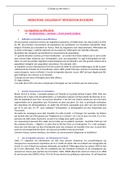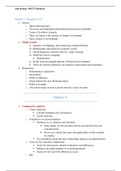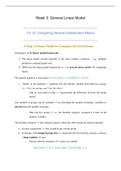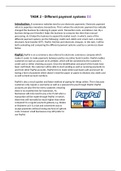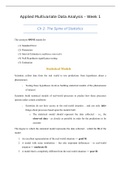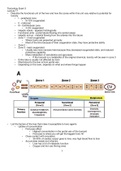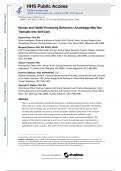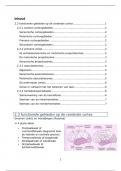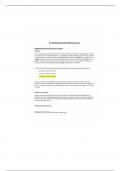Wednesday, 11 November 2020
Quantitative Research Notes
Lecture 1, 2, 3, 4, 11 and 12.
These notes cover the following:
1. Causality,
2. Validity in an experiment,
3. Control problems,
4. Single-factor designs,
5. Observational research,
6. Ethics.
Causality
A history of methods in psychology:
- After handing out handouts regarding methods and problems in psychology, he wrote a book in 1938
called ‘Experimental Psychology’.
The purpose of the experiment:
• .. to demonstrate causality (cause and effect),
• For this to happen, there are three requirements:
1. Cause must precede effect in time (if they occur or are measured simultaneously, we do not have
‘temporal precedence’),
2. Cause and effect must be empirically correlated with one another (as the cause goes up, the effect
must go up or down — there must be a relationship),
3. The relationship between cause and effect cannot be explained in terms of a third variable.
Should the cause be both necessary and sufficient to explain the effect?
What are the features of an experiment?
• Establishing independent variable (IV)
- Creating experimental conditions that are under the direct control of the researcher.
1
, Wednesday, 11 November 2020
• Control extraneous variables,
- Not of interest to the researcher,
- Must be controlled, otherwise it leads to confounding.
• Measure dependent variables (DV),
- Behaviours that are measured in the study,
- Must be defined precisely.
IV:
• Must have a minimum of two levels (e.g. yes and no or high and low),
May be:
- Manipulated (you, the experimenter, are in charge of e.g. whether a room is noisy or quit) or subject
variables (what the participants brings into the room e.g. you cannot manipulate gender),
- Situational - the features of the environment that participants may encounter,
- Task - variations in the task given to the participants,
- Instructional - variations in the instructions given e.g. some participants must picture an object in their
head while others must say the word quietly.
Controlling extraneous variables:
• We need to control anything that is not of interest to us i.e. we need to eliminate any ‘third variable’
explanations.
Measuring the DV:
• The credibility of an experiment depends on — among other things — the operational definition of the
measured outcomes.
__________________________________________________________________________________________
2
Quantitative Research Notes
Lecture 1, 2, 3, 4, 11 and 12.
These notes cover the following:
1. Causality,
2. Validity in an experiment,
3. Control problems,
4. Single-factor designs,
5. Observational research,
6. Ethics.
Causality
A history of methods in psychology:
- After handing out handouts regarding methods and problems in psychology, he wrote a book in 1938
called ‘Experimental Psychology’.
The purpose of the experiment:
• .. to demonstrate causality (cause and effect),
• For this to happen, there are three requirements:
1. Cause must precede effect in time (if they occur or are measured simultaneously, we do not have
‘temporal precedence’),
2. Cause and effect must be empirically correlated with one another (as the cause goes up, the effect
must go up or down — there must be a relationship),
3. The relationship between cause and effect cannot be explained in terms of a third variable.
Should the cause be both necessary and sufficient to explain the effect?
What are the features of an experiment?
• Establishing independent variable (IV)
- Creating experimental conditions that are under the direct control of the researcher.
1
, Wednesday, 11 November 2020
• Control extraneous variables,
- Not of interest to the researcher,
- Must be controlled, otherwise it leads to confounding.
• Measure dependent variables (DV),
- Behaviours that are measured in the study,
- Must be defined precisely.
IV:
• Must have a minimum of two levels (e.g. yes and no or high and low),
May be:
- Manipulated (you, the experimenter, are in charge of e.g. whether a room is noisy or quit) or subject
variables (what the participants brings into the room e.g. you cannot manipulate gender),
- Situational - the features of the environment that participants may encounter,
- Task - variations in the task given to the participants,
- Instructional - variations in the instructions given e.g. some participants must picture an object in their
head while others must say the word quietly.
Controlling extraneous variables:
• We need to control anything that is not of interest to us i.e. we need to eliminate any ‘third variable’
explanations.
Measuring the DV:
• The credibility of an experiment depends on — among other things — the operational definition of the
measured outcomes.
__________________________________________________________________________________________
2

